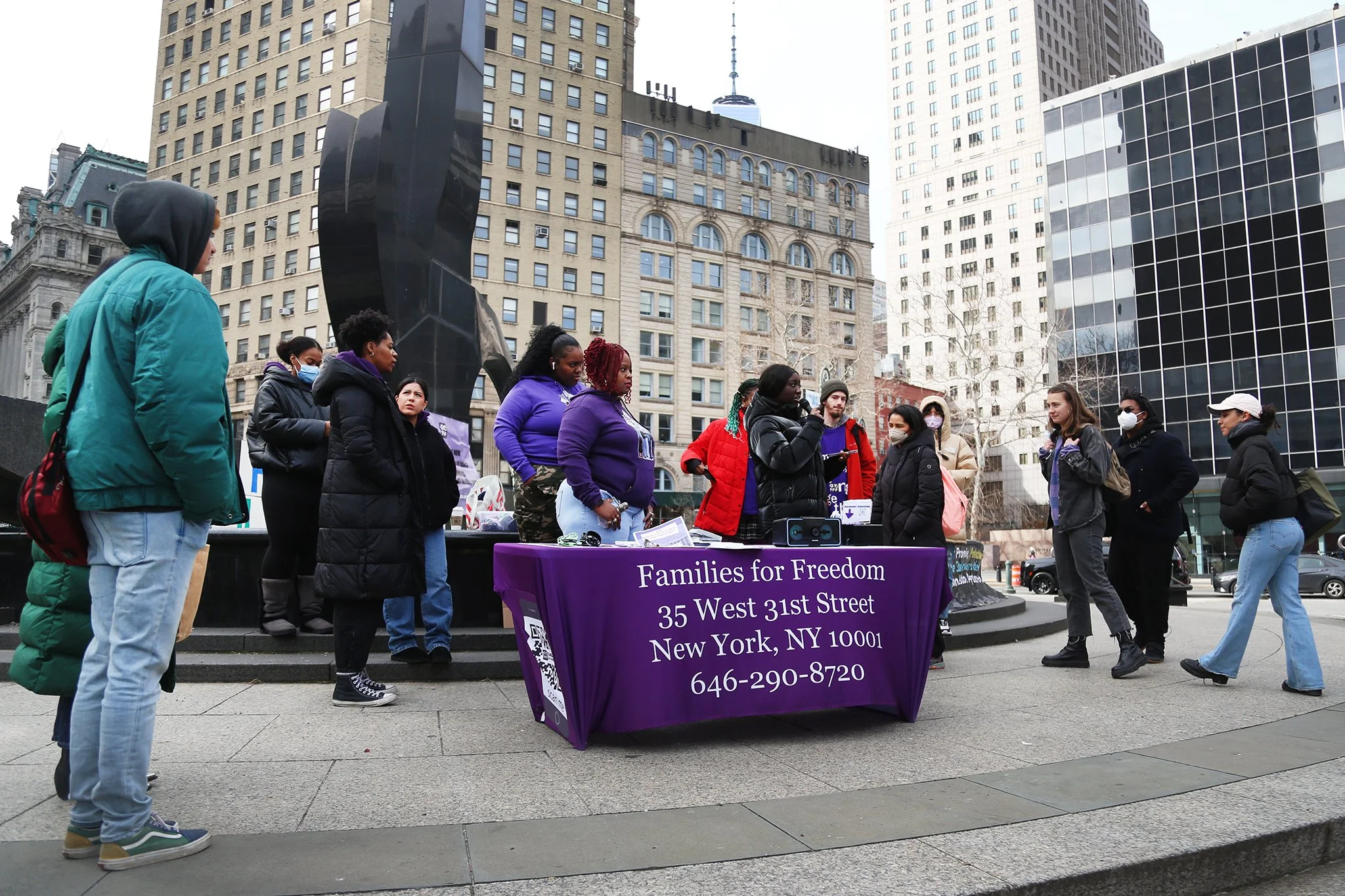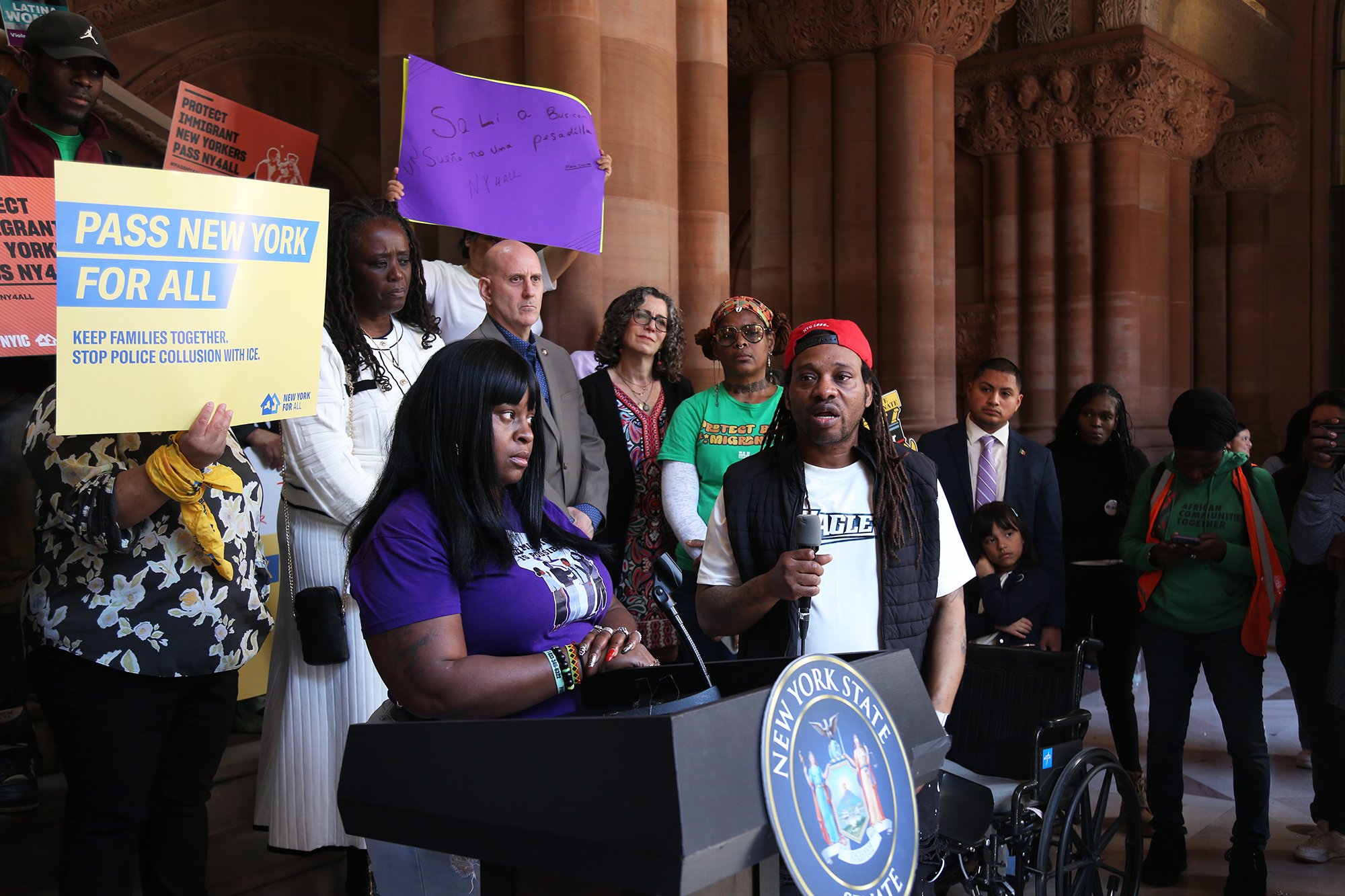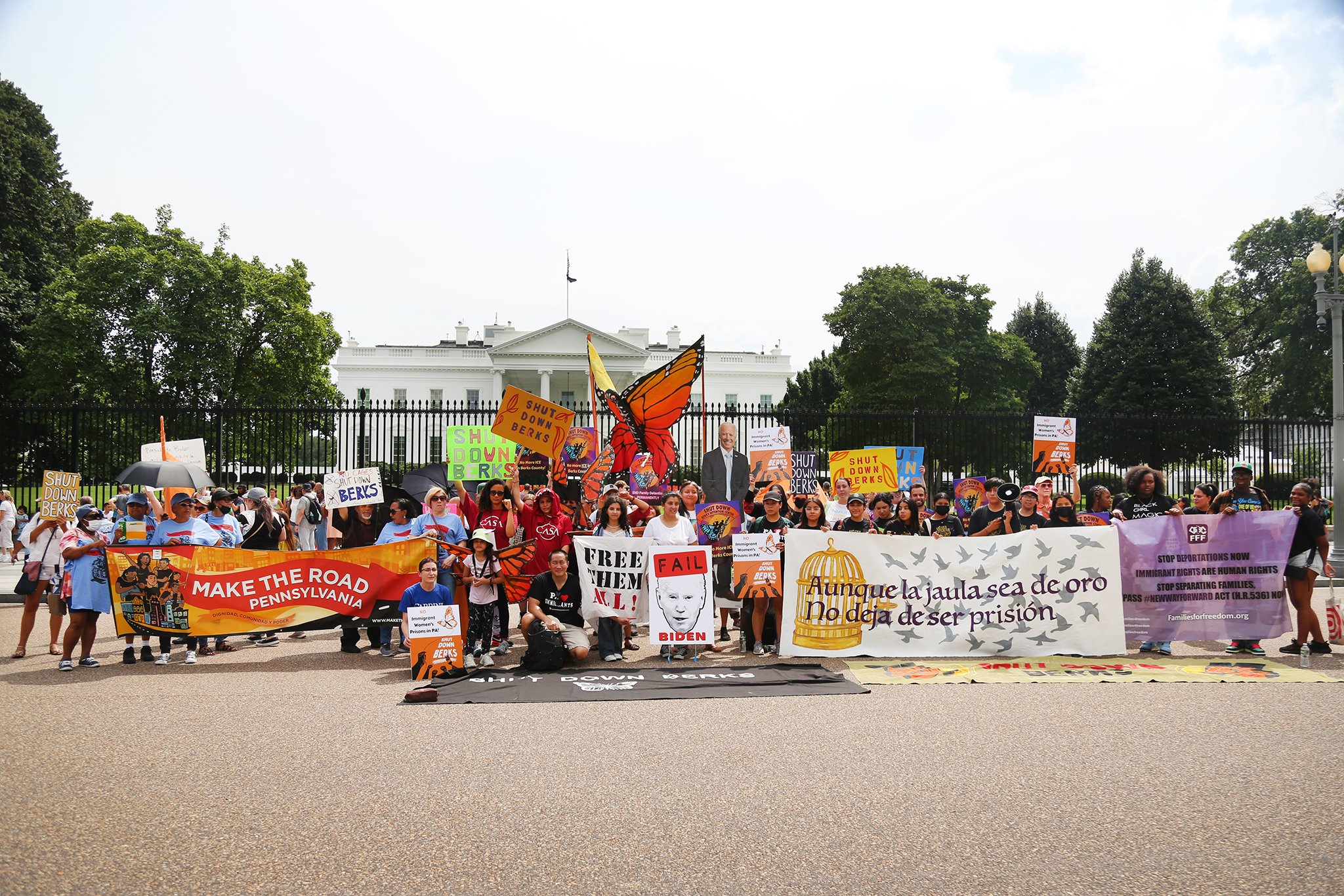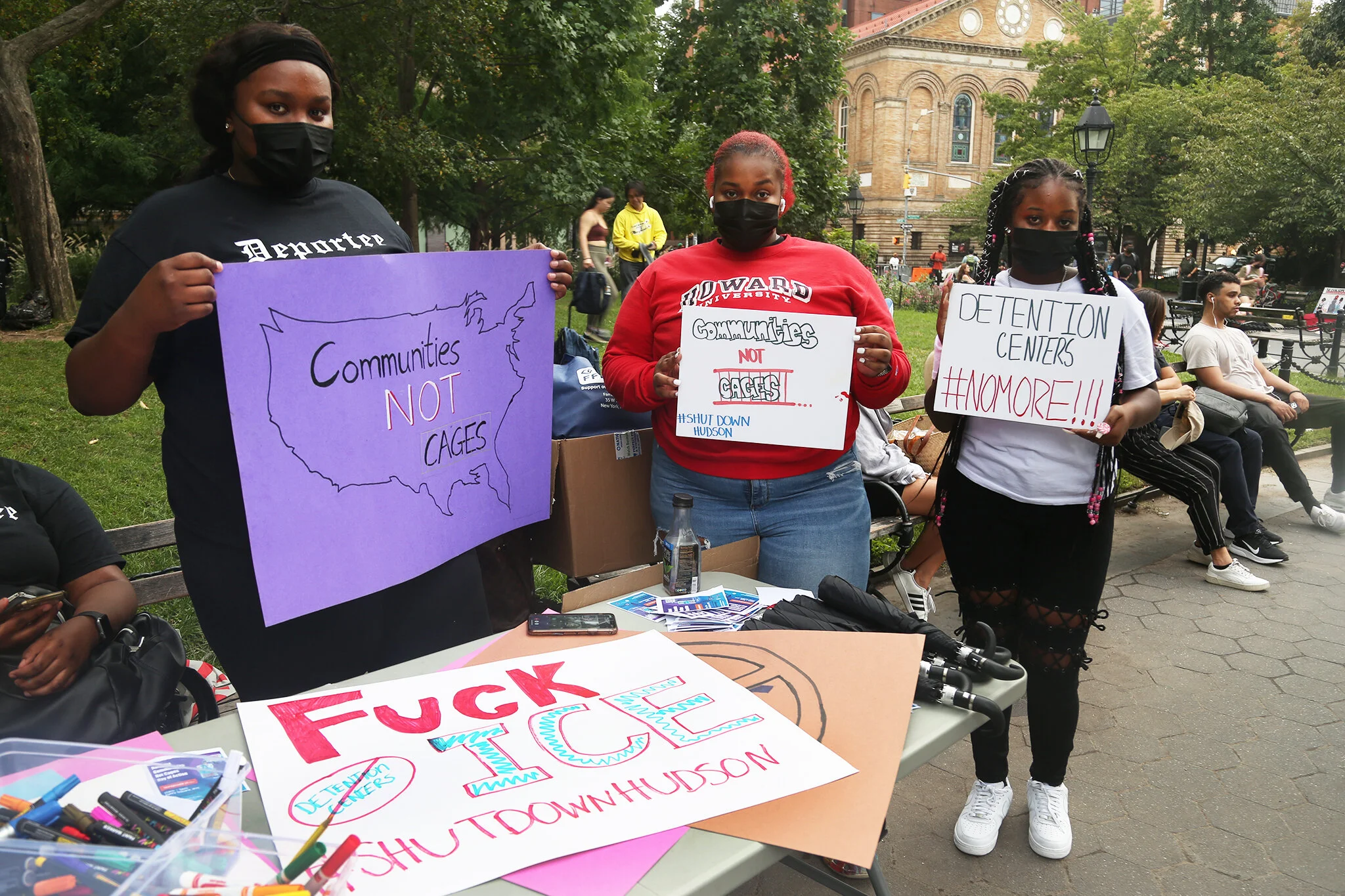20 years ago, the Shahani family, Subash Kateel, and Maria Muentes came together and founded Families for Freedom. Their goal was to fight against the deportations ravaging our communities and separating our families.
Families for Freedom has changed tremendously since its founding. We have implemented new programs, grown our membership, built alliances, and much more. As of recently, we started going through a revitalization process. We now have a new director and a fresh team of committed staff to carry on our initial vision: people who are directly affected, accessing and building power where needed, lead a movement that engages members and allies to roll back the mandatory detention and deportation provisions of the 1996 laws, to change the way the US sees and treats immigrants.
We at Families for Freedom see the brutal immigration enforcement regime as having a crushing human toll on New York immigrant communities, and those around the country at large. The process of detention and removal destroys the economic security of already marginalized migrant families, removing members to countries they barely know, whilst leaving their families in economically and socially precarious situations here in the US.
Our team aims to support migrants by providing accompaniment to ICE check-ins , detention center hotlines (to assist detainees in making calls to their family, attorneys and courts so that they don’t feel alone), and providing direct resources for migrants in the city.
-

Proactive campaigning
Our ultimate goal is to play a role in the conversion of the US immigration regime into one that has human rights and justice as its guiding principles. This requires a campaigning strategy that not only advocates for those within the system, but also looks to shift policy and legislation at the local, state and national level so that the most damaging effects of the enforcement regime are rolled back. We do this through active lobbying and advocacy with elected officials and engagement with public discussions concerning the policing, detention and deportation of immigrants.
-

Migrant Support
We have been assisting migrants by providing them with essential items for clothing; coats, blankets, shoes etc. We also help them complete immigration forms such as applications for asylum and green cards.
Additionally, we offer them a safe haven as most of them are homeless and can use our office address to ensure they do not miss important immigration mail.
-

Grassroots leadership and community organizing
We believe that those most directly impacted by US immigration enforcement policies are in the best position to provide the support to others going through the same traumatic experience. Our leadership have personal experiences with the intricacies of the US deportation system, we understand the emotional toll it has, and are well experienced in resisting it. Through this community based organizing, we aim to lighten the burdensome load that families with members in the system are going through.
-
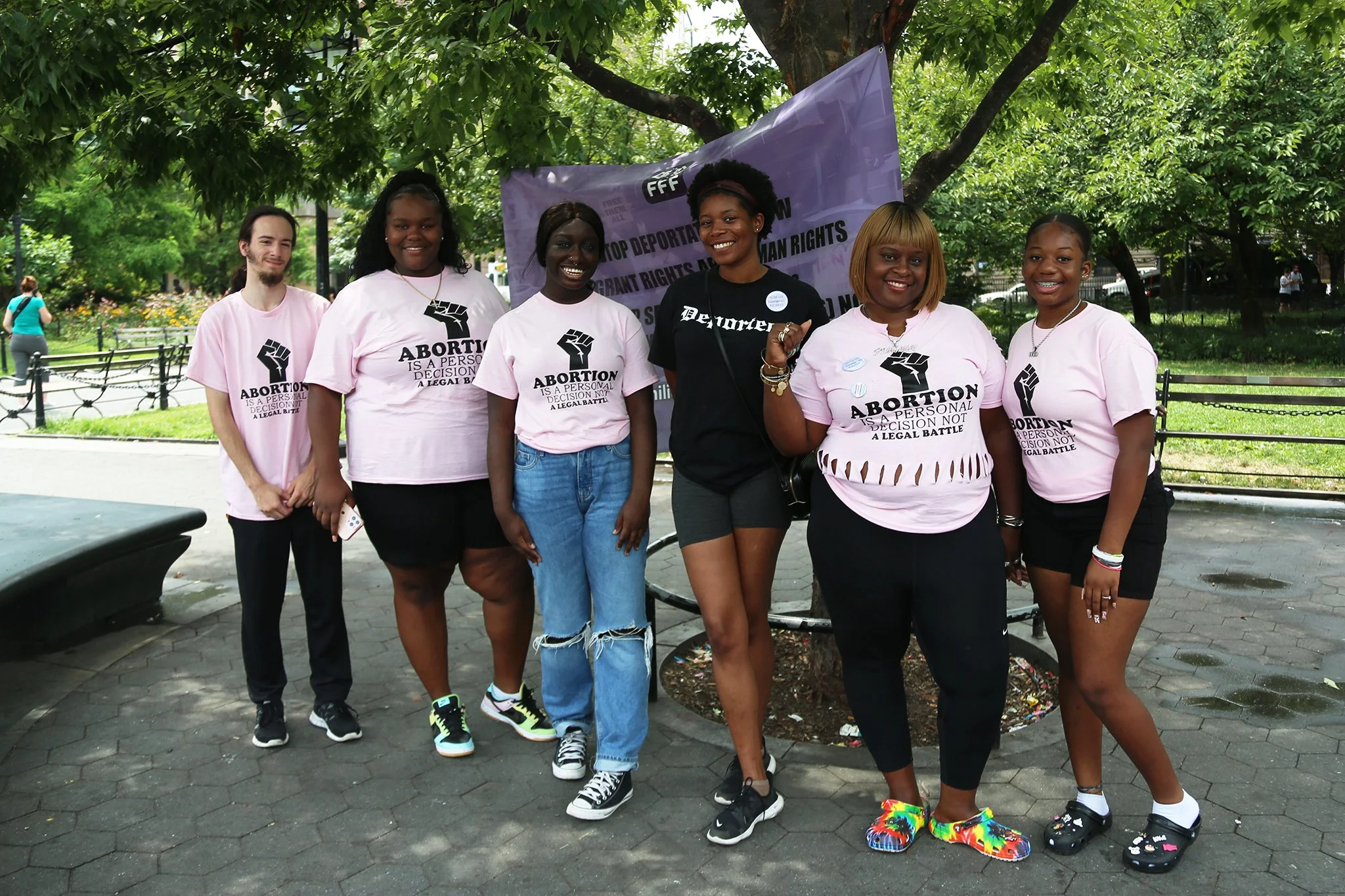
Women's Right
We continue to fight against the criminalization of a person's rights to bodily autonomy and advocate for healthcare accessibility for all, and to demand the release of incarcerated women across the nation.
FFF History throughout the years
20 years ago, three families came together to confront the largely invisible crisis of deportation. Together they broke the silence and overcame the isolation that many families face when one of their members is facing deportation. Creating an informal network focused on providing mutual support and education, the Shahani Family, Subhash Kateel, and Maria Muentes formed Families for Freedom (FFF). They met in small apartment living rooms overflowing with people from all continents of the world. From these three founding families' vision grew a powerful organization that has involved hundreds of families fighting on the frontlines of this nation's immigration debate.
Families for Freedom emerged in the aftermath of 9/11 and the increased policing and surveillance of Arab and Muslim communities. Under the guise of the “war on terror”, thousands of people were ripped from their families, locked in detention centers and eventually deported. In the early 2000s, we were faced with a dangerous issue. Deportation was, and still is, a huge problem in the United States.
Immigrants Are Essential March
In the decades following the passage of harsh legislation like the Patriot Act, many immigrant communities who were not a part of this target population felt they were immune to the destructive immigration enforcement policies of the George W. Bush administration. However, with the creation of the Department of Homeland Security in 2002, this new national security focus began to fuse with the country’s thirty-year focus on immigrants with criminal convictions. This process has deep roots, but was turbocharged during the Ronald Reagan administration's “war on drugs” and “war on poverty” – and given bipartisan support through the passage of Clinton-era immigration enforcement legislation like the “Illegal Immigration Reform and Immigrant Responsibility Act of 1996”.
As the new millennium progressed, pre-existing divisions between the “good immigrant” and the “bad immigrant” were consolidated through a toxic media landscape, resurgent grassroots xenophobic attitudes, and the emergence of relentless federal enforcement bureaucracies like Immigration and Customs Enforcement and Customs and Border Patrol. Much of the national debate and policy decisions focused on allowing “hard-working” immigrants to stay whilst deporting those with criminal convictions, even after they have served their sentences. This logic continued under the Obama Administration, who, despite making promises to overhaul the US immigration enforcement system, turbocharged criminal-based deportations and engagement, deporting over three million people during its two terms.
By the election of Donald Trump in 2016, US deportation had become a sprawling system with public and private interests undergirding its yearly expansion. Feeding this sprawling system of removal is an archipelago of over 200 jails and detention centers that make up ICE’s detention system. Many of the immigrants detained in ICE’s nominally civil system are held in county and local jails that contract with ICE to detain immigrants. The rest are held in dedicated immigration detention facilities run by ICE or contracted to private prison corporations, including family detention centers that hold mothers and children. Today, even in Joe Biden’s administration, mass deportation and detention of migrants continues to take place, and we continue to fight against the inhumane machine that mistreats migrants to this very day.
“Throughout 2011, we pressed for the passage of the Child Citizen Protection Act, which would help immigrants to stay in the U.S. to stay with their citizen children. We held a rally at ICE headquarters at 26 Federal Plaza on Father’s Day featuring the voices of youths whose fathers had already been deported or facing deportation. The act was passed in 2012.”
“In 2012, FFF held actions in accordance with its role in the Steering Committee of the Private Prison Divestment Campaign. On March 11, 2012, Migrant Power Alliance, a coalition founded by FFF and several other groups, launched an action in front of Varick Street immigration court. This rally of close to 100 people protested the mass deportation program of the Obama administration and exposed New York Senator Schumer’s acceptance of thousands of dollars from a pro-immigrant detention lobby funded by detention corporations CCA and GEO.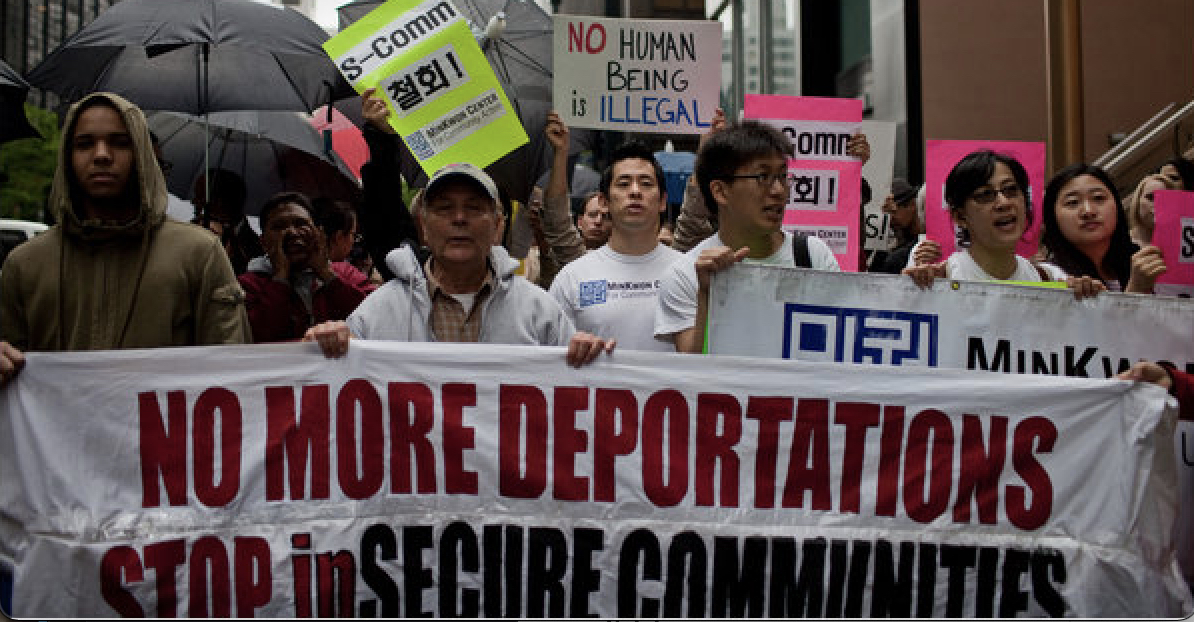
”
“The Deportee International Justice Campaign demanded that foreign governments defend their nationals in the deportation process. We launched the campaign by convening a Consulate Roundtable in New York with over a dozen consulates who represent our nationals. We dialogued for months thereafter and surveyed the consulate on how they facilitate the deportation process. At our 2nd Roundtable, we presented three recommendations to countries receiving deportees: provide services to nationals facing deportation; prevent illegal deportations; and intervene in cases of abuse. We have traveled to our nation’s capital and abroad with these recommendations. On the 10-year anniversary of the 1996 immigration laws, we took buses of families to Washington DC. During this Grassroots Nationwide Mobilization, we visited several embassies.”
“The One Day to Protect New Yorkers Act fixes a discrepancy between federal and state sentencing laws that puts people at risk of immigration detention and deportation.
Many federal immigration consequences are imposed for offenses punishable by sentences of one year or more, and misdemeanors in New York are punishable by up to and including one year. This one-day overlap between the sentencing schemes affects thousands of immigrants, who can face immigration detention without bail and immigration court with most defenses barred from them due to the misdemeanor offense. This is the case even if someone is never actually sentenced to a single day in jail – the potential sentence is what triggers the consequences.
”
“Pennsylvania is currently home to the Berks County Family Detention Center (BCRC), one of three detention centers for immigrant families, where children as young as two-weeks-old have been incarcerated, and families have been held for more than a year at a time. Berks is the only publicly-owned family detention center in the country.
Families for Freedom has been a member of the “Shut Down Berks Coalition” - a group of organizations and individuals fighting to close the Berks family prison in Pennsylvania and end the practice of imprisoning immigrant families in the U.S. Members of the coalition include organizers, lawyers, immigrant leaders, and allies.”
“On December 13, 2017, Abdi was traveling home to his family in Columbus, Ohio when he was detained at JFK airport. Abdi, a legal permanent resident, had just passed through two levels of customs and immigration inspection, and his passport was stamped “admitted” when he was stopped by an officer who asked if he was from Mogadishu. CBP officers detained Abdi for fifteen hours and interrogated him without a Somali interpreter, even though he repeatedly asked for one. During his interrogation, Abdi was surrounded by armed CBP officers and threatened with years of imprisonment and deportation.
Abdi was then transferred to Elizabeth Detention Center where he has been detained ever since, ten hours from his family. Leaving his wife to raise their two baby daughters by herself, without his support. Despite being admitted with a green card, Abdi is now forced to fight for asylum to save his life. After a sustained campaign, Abdi was released in 2019.”
“On December 13, 2017, Abdi was traveling home to his family in Columbus, Ohio when he was detained at JFK airport. Abdi, a legal permanent resident, had just passed through two levels of customs and immigration inspection, and his passport was stamped “admitted” when he was stopped by an officer who asked if he was from Mogadishu. CBP officers detained Abdi for fifteen hours and interrogated him without a Somali interpreter, even though he repeatedly asked for one. During his interrogation, Abdi was surrounded by armed CBP officers and threatened with years of imprisonment and deportation.
Abdi was then transferred to Elizabeth Detention Center, where he has been detained ever since, ten hours from his family. Leaving his wife to raise their two baby daughters by herself, without his support. Despite being admitted with a green card, Abdi is now forced to fight for asylum to save his life. After a sustained campaign, Abdi was released in 2019.”
“Immigrant Justice Network, Families For Freedom, along with a coalition of grassroots and national organizations, demands that Congress take legislative action to disentangle the criminal legal and immigration systems that propagate mass incarceration and mass deportation, paving a New Way Forward for immigrant justice.
The New Way Forward Act (H.R. 5383) would:
Reduce mass incarceration by ending mandatory detention and banning for-profit immigration jails.

